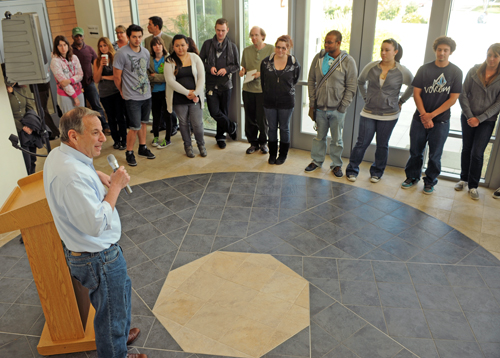
By Donald H. Harrison

EL CAJON, California – Grossmont College has been revisiting the Civil Rights Movement, bringing to campus former Freedom Riders like Robert and Helen Singleton and Congressman Bob Filner.
The Singletons appeared at a March 17 event introducing Breach of Peace, a photo and follow-up book by Eric Etheridge on what happened to the 329 Freedom Riders arrested in Mississippi in the early 1960s. For students at the 2-year-college, this was history coming alive. For some of the older members of the faculty, myself included, this was a nostalgic trip back to our own student days. No, I wasn’t a Freedom Rider, but I met and covered some of them as a student journalist at UCLA.
Congressman Filner visited the campus on March 28 to see a photo exhibit in Building 20 drawn from the collection of Etheridge’s “where-are-they-now” photos, and to relate some of his own experiences as a Freedom Rider from New York.
He said that for him—and perhaps for other Jews as well—Freedom Riding to challenge the segregation of interstate buses in the South was, in part, a reaction to the Holocaust. His father, who served in the U.S. Army during World War II, spoke some Yiddish – enough to be assigned by his superiors at the end of the war as a translator for Jewish inmates in a former Nazi concentration camp.
What the elder Filner saw and heard shook him to his core. He had not realized that people could be so bestial to each other. The lesson he took home – and later taught to his only son—was that Jews need to be in the forefront of fighting discrimination, for reasons both of idealism and self-preservation. Sooner or later people who hate other groups of people will get around to hating Jews, Filner’s father reasoned.
So, the congressman said, his parents could not really object when he decided to ride on an integrated bus through Mississippi, an act which prompted his arrest and imprisonment in a Mississippi State Prison. The father’s jocular complaint was “But, did he have to do it on my credit card?” For lack of other facilities, the Freedom Riders were lodged two-to-a-cell on Death Row in the Mississippi State Prison. Filner said his parents urged Mississippi’s rabbis – “all four of them” – to visit him at the prison. He said that his mother and stepmother telephoned the prison warden on an almost daily basis to make certain he was okay. A large percentage of the white Freedom Riders were Jews, he told me.
Freedom Riders kept each other’s spirits high during their incarceration. They sang, relayed messages to each other down the row of cells, and even fashioned chess pieces out of stale bread, using the brown crusts for one set of pieces, the white bread for another.
Thirty-one years after his arrest, in 1992, Filner was elected to Congress, joining another Freedom Rider, John Lewis, who had been elected to Congress in 1986. Another Democratic congressman, Sunny Montgomery, by then chair of the House Committee on Veteran Affairs, had been the major general in charge of the Mississippi National Guard which had arrested Filner and other Freedom Riders. Notwithstanding their past political differences, he and Filner became good friends.
Addressing students and such administrators as Grossmont President Sunita V. Cooke in the Rotunda of Building 20, Filner was asked whether he believed there were any causes worthy of students going to jail today.
He said he thought looming cuts to education – whether they be the Federal Government reducing Pell Grants, or the state government chopping funds—are unconscionable. “This is your future,” he told the students. He said he favored peaceful protests at the U.S. Capitol and California’s Capitol, suggesting that students should also dramatize the need for continued public broadcasting programming for pre-schoolers by having everyone show up at demonstrations dressed as Elmo’s. Regardless of whether legislators are Republicans are Democrats, he suggested, they have children or grandchildren who love the Sesame Street character.
*
Harrison is editor of San Diego Jewish World. He may be contacted at donald.harrison@sdjewishworld.com